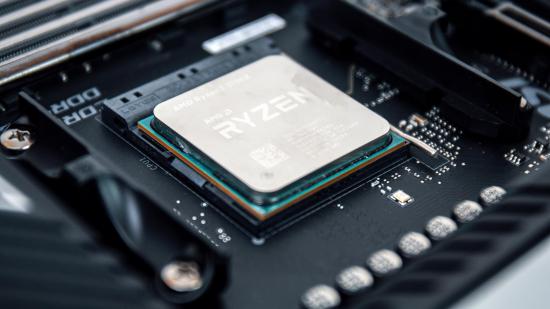It wasn’t too long ago that we discussed the likelihood of cheaper PCIe 4.0 boards hitting the market in Q1. Well, it appears we were right. Gigabyte has submitted various models of AMD Ryzen-compatible B550 motherboard to the Eurasian Economic Commission (EEC) (via VideoCardz). This list includes six models in its flagship Aorus line, and a couple in the more budget-friendly – but feature-sparse – Gaming X line.
The past couple of years have been great for AMD. With its mid- and high-end CPU range already beating Intel on price, core-count, and manufacturing process, since the release of the X570 chipset back in July they have also supported PCIe 4.0. PCIe 4.0 boards haven’t been cheap, however, running a cost that’s closer to £200 than £100. This is where Gigabyte might save the day: these B550 boards will most likely be cheerful – you know, because they’re cheap?
PCIe 4.0, as is the case with each iteration, doubles the transfer bandwidth from PCIe 3.0’s 8GT/s to 16GT/s. Theoretically, this means that with PCIe 4.0 there can be up to 32GB/s of data transfer. This allows manufacturers to crank up read and write speeds for SSDs, and increase available GPU bandwidth.
The list of 8 B550 chipset motherboards submitted to the EEC by Gigabyte are as follows:
- B550 AORUS ELITE
- B550 AORUS PRO
- B550 GAMING X
- B550M AORUS PRO
- B550M DS3H
- B550M GAMING
- B550M H
- B550M S2H
There’s no definite guarantee that these boards will be PCIe 4.0, but considering a B550A chipset has already been seen in previous (OEM-only) motherboards, it would be a bit silly for them not to be.
As we discovered when comparing the (PCIe 4.0) Corsair Force MP600 M.2 SSD to the (PCIe 3.0) Samsung 970 Evo M.2 SSD, the boosted bandwidth only improves initial game load times. Once you’re actually in-game the difference is negligible. It’s all good having double the bandwidth in theory, but when games aren’t utilising it you might as well have stuck to 3.0.
On top of this, with AMD Zen 3 just around the corner, it makes you wonder why it felt the need for a new budget chipset on the eve of 600-series boards. AMD is set to retain the AM4 platform for at least one more Zen CPU generation, however, so these budget B550 boards will likely prove useful, perhaps cheaper, alternatives.
All this aside, it’s nice to see that more affordable options for PCIe 4.0 motherboards are on the way. And not everything is about gamers, after all. PCIe 4.0’s increased bandwidth does allow for faster data transfer from those SSDs that support it. It might also be that the sooner PCIe 4.0 boards hit the market, the sooner games start to properly utilise the increased bandwidth.
